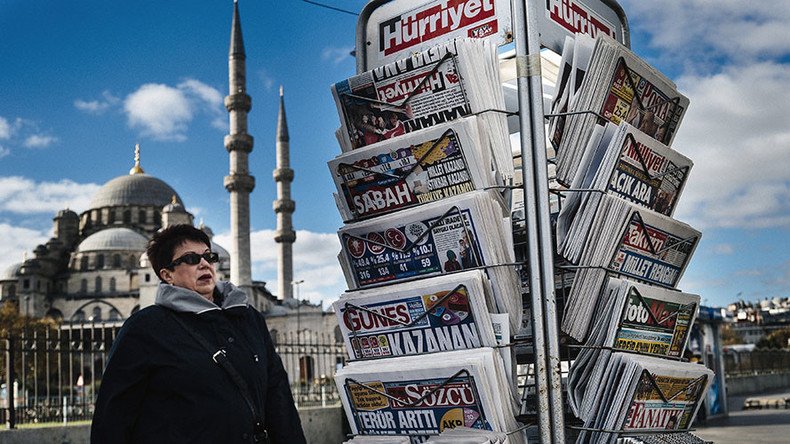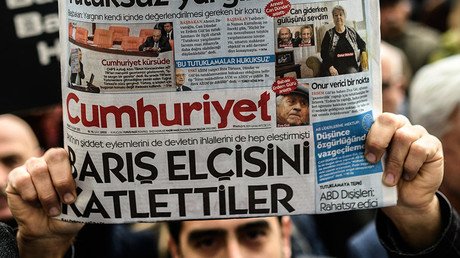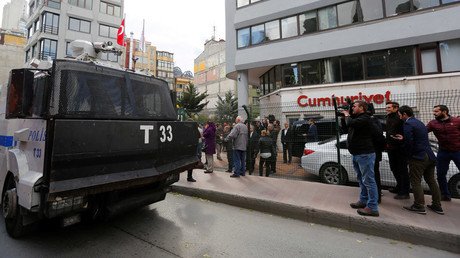New EU report slams Turkey for ‘relapse’ in attacks on press freedom – German media

An annual report by the European Commission on Turkey's candidacy for European Union accession slams it for press freedom repression and post-coup attacks on the judiciary sphere, German media reported.
According to Frankfurter Allgemeine Sonntagszeitung, that claims to have seen a “good hundred pages long” draft of the report to be published on Wednesday, the Commission complains that legal provisions on national security and the fight against terrorism have been applied “selectively and arbitrarily” in Turkey, which led to “a serious relapse” in the field of freedom of expression.
The commission expressed “serious concern” about dozens of arrested journalists and the closures of media outlets since the failed coup in the country back in July this year, according to the paper. The closures and arrests targeted editorials and people whom Ankara suspected of having links to either PKK (Kurdistan Workers' Party) or to cleric Fethullah Gulen. The former is an insurgent militia considered a terrorist group by Turkish authorities, while Ankara believes Gulen to be the mastermind of the governmental coup plot that aimed to topple President Recep Tayyip Erdogan.
Some 170 newspapers, magazines, TV stations and news agencies have been closed, leaving 2,500 journalists unemployed, Turkey's association of journalists said, as cited by Reuters.
Just last week Turkish authorities arrested the editor-in-chief and issued arrest orders for at least 13 employees and executives of the independent Cumhuriyet newspaper. The move sparked concern from Ankara's EU partners, who said that European standards apparently have no importance for Turkey. European Parliament President Martin Schulz even said Ankara had crossed the “red line” against freedom of expression with the arrests, to which Turkish authorities countered that Ankara would not be intimidated by the EU's “threats.” Prime Minister Binali Yildirim even declared that “we don't care about your red line.”
The Commission’s report also allegedly details a “relapse” with regard to the independence of the judicial system in Turkey. It says that one-fifth of Turkish judges and prosecutors were dismissed after the failed coup. It criticizes the fact that some of those arrested had been held in custody for up to 30 days before being brought before a judge – a measure ordered by Erdogan during the state of emergency imposed right after the failed coup. The report states that during this time prisoners were repeatedly tortured, although it does not confirm this, referring rather to media and human rights groups’ reports on the matter.
At least 37,000 people have been arrested and thousands of civil servants suspended in purges that followed the coup. Ankara launched a massive purge of suspected Gulen supporters among the military, police, judges, municipal officials and other branches of the government. In its report, the EU Commission allegedly raised “very serious questions” about the collective approach the Turkish government showed against the people suspected of being Gulen’s sympathizers. For instance, it pointed to the fact that many of those people’s guilt was merely some or other “association” with Gulen, rather than their own unlawful actions.
The European Commission’s report is the result of evaluating potential member-states and their progress toward European Union membership and is drawn up once a year. It always lists downsides in the country’s progress, but does not give recommendations on how to proceed with it or whether to grant membership. Political evaluation therefore falls on the heads of the Commissioners and Member States’ representatives, who are to discuss the report on Wednesday.
The EU initially reacted nervously to Turkey’s course of action that followed the coup. It even threatened to suspend accession talks with Ankara, if Erdogan delivered on his threat to lift a moratorium on capital punishment. Ankara in response threatened to pull out of the controversial EU-Turkey migrant deal, with the latest threat coming in last Thursday, when Turkish Foreign Minister Mevlut Cavusoglu told Swiss newspaper Neue Zurcher Zeitung the deal will be off unless visa-free access to the Schengen zone is granted for Turkish citizens by the end of the year.














